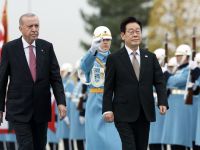Riyadh and Cairo are cooperating fully with the US-led war on terror despite the mounting public dissent they face at home, US Secretary of State Colin Powell said Sunday.
"They are with us. I mean, both Egypt and Saudi Arabia have responded to every request we have made of them," Powell was quoted by AFP as telling Fox News Sunday from Shanghai, where he attended the APEC economic summit with Asian leaders.
However, the US top diplomat noted that "they have people within those two countries who are not happy with what we are doing."
Several of the 19 presumed hijackers of four commercial aircraft that crashed into US targets on September 11 carried Egyptian or Saudi passports.
Saudi Interior Minister Prince Nayef bin Abdel Aziz said Saturday that the authorities had arrested a number of pro-bin Laden nationals, while Egypt has put to trial about 200 alleged members of the outlawed Al Jihad and Gamaa Islamiyya rebel groups.
Prince Nayef earlier told reporters that his country was subject to harmful propaganda in the Western media, but said the kingdom would not give in.
However, protests against the US strikes against Afghanistan have flared in both Egypt and Saudi Arabia, where the practice of Wahhabism, a strict interpretation of Islam, parallels that of Afghanistan's ruling Taliban militia, said AFP.
Maverick Republican Senator John McCain criticized what he said was a lack of commitment to concrete assistance to the United States from the two countries, considered the strongest US allies in the Arab and Muslim world and pivotal to garnering Arab support for the war on terror.
McCain speaking on NBC news Sunday, called for Riyadh and Cairo to "take the megaphone back from extremist elements."
A scathing editorial last week by the New York Times condemned Saudi leaders as not having done enough to fight terrorism.
A number of Saudi Islamic clerics have openly condemned the US strikes, but Prince Nayef has categorically denied claims about pro-bin Laden demonstrations in the kingdom that is the largest purveyor of foreign oil to thirsty US consumers.
"If we want them to be the kind of nations and lands that we preach about, we have to expect that, if there is another point of view within that country that differs from the official point of view of the government, you have to give it the opportunity to be expressed," Powell insisted – Albawaba.com
© 2001 Al Bawaba (www.albawaba.com)







